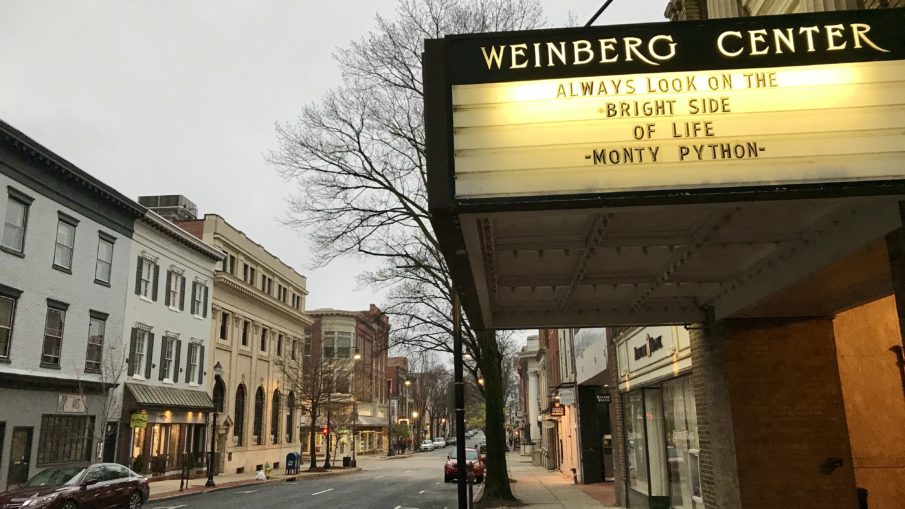The marquee of the Weinberg Center, which usually displays information about their upcoming shows, read, “Always look on the bright side of life.” This Monty Python quote, hovering in illuminated letters over the eerily deserted West Patrick Street, was displayed on a recent Saturday evening. Under normal circumstances, the streets of downtown Frederick would be packed with diners and shoppers on a fair-weather weekend. But these are not normal circumstances.
In early March, the timeliest issue in Frederick County was the early arrival of spring. Blooming fruit trees and magnolias painted parks, gardens, and highway medians in colorful shades usually reserved for April. But in the weeks since, another unusual occurrence has taken hold of the collective consciousness. As local businesses and residents continue to adjust to the ongoing spread of the novel coronavirus, some have been affected more than others, and in profoundly different ways.
“We’re all trying to work together to weather this storm,” said John Healey, executive theater manager of the Weinberg Center for the Arts. “Frederick is such a great downtown area, I’d hate to see any of the businesses have to close shop because of this. I think everyone is doing their best.”
The Weinberg Center has cancelled or postponed all performances through April 30, with the possibility of further cancellations to come.
“It’s an interesting time,” Healey said. “It’s going to change the industry in some shape or form. We all have to adapt and make the best of it.”
Few of Downtown Frederick’s businesses have been spared from the upheaval. The Rock Shop on North Market Street, for example, initially intended to operate on a reduced schedule, as the owner said many of his employees did not want to come to work during the pandemic. However, the store now has a sign posted on its front door: “Closed until further notice. Stay well, my friends!”
Area residents have likewise been affected in various ways, depending largely on the nature and location of their work.
“I feel really lucky that I’ve been able to do a significant amount from home,” said Darlene Richardson, education and CSA coordinator for Red Wiggler Community Farm in Damascus. Many of the farm’s employees do a mixture of farm and office work. And, for the time being, they’re completing all of their office work at home, but employees still have tasks that must be done on-site.
“This is the most important time for farms,” Richardson said. “If we’re not working now, then there’s no food come June through November.” In order to limit interpersonal contact they are often planting with crews as small as three, instead of the 10-13 growers who would normally be allocated to such jobs.
As many industries increasingly utilize the internet to circumvent coronavirus concerns, some members of the community benefit from the solitary nature of their work.
“This is the same for me as it always is,” said Amanda Linehan, an independent fiction author in Frederick. “I work from home regardless, so work-wise not much has changed at all, in terms of how much I work, where I work, and work schedule.”
Other individuals whose occupations require face-to-face interaction have been hit harder.
“I don’t have any work,” said Britta Kallevang, who was a learning assistant in the Writing Center at FCC before the campus closed to students for the semester. “It’s been a heartbreak.”
Kallevang and others have also discovered silver linings to the current situation. “I’ve found that people are kinder to each other,” she said. “Strangers smile more. People hold doors open more. People just say ‘hi’ more often.” She concluded with a laugh, “And I actually find my dad good company now.”
“I’ve really appreciated all the technology we have to keep in touch in various ways with people without being face to face,” Linehan said. “I belong to a number of groups who now meet virtually. People are texting more and calling more and facetiming more. In a weird way, there’s been an increase in connection, or in people wanting to connect because we’re all at home.”
One of the best antidotes for the disorientation caused by the coronavirus may come from the consistency of the natural world.
“The really beautiful thing about working on a farm is that you notice all the things that haven’t changed,” Richardson said. “The dandelions are up because this is the time that they come up. The kale still needs to be planted, the onions still need to go into the ground, and the birds are still nesting.”
Richardson concluded: “Everything is happening in the time where it should, even though everything else is different. Some things haven’t changed, and that’s really nice.”

